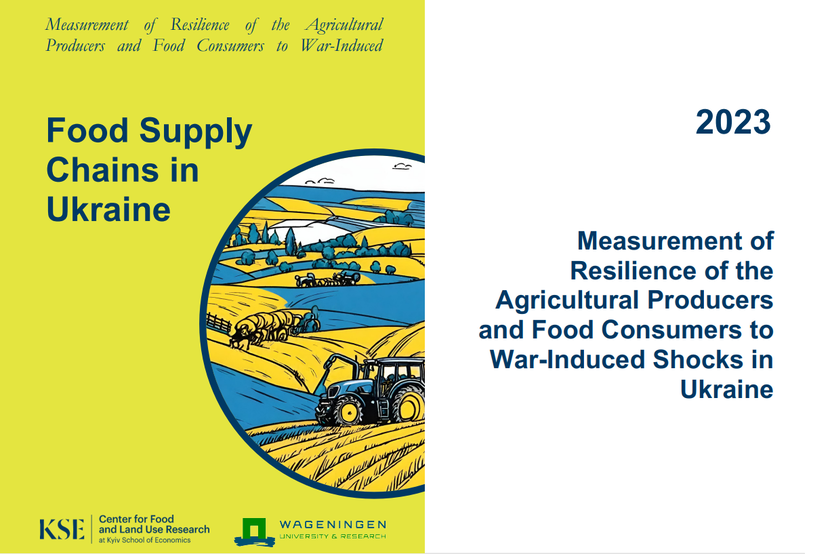2022-2024 - ClimAgri4Ukraine - Towards climate resilient smart agriculture and sustainable food systems in Ukraine
The Objective of the project is to develop innovative climatic and socio-economic measurement and analysis models which quantify the resilience of Ukrainian agriculture, predict future farming conditions and economic status of food producers and consumers. Explore transformative governance arrangements for sustainable and resilient food consumption and production. Support the Ukrainian research and policy agenda with recommendations for climate-smart agriculture and implementation of a National Road Map for ‘Sustainable Food Systems’.
Project information
Executed: Sep 1, 2022 - May 31, 2024
Partners:
- Agricultural Economics and Rural Policy
- Wageningen Food & Biobased Research
- Earth Systems and Global Change
- Environmental Policy
Kyiv School of Economics (KSE)
National University of Life and Environmental Sciences of Ukraine (NUBiP)
The project is funded by the Ministry of Agriculture, Nature and Food Quality of the Netherlands.
Sub-projects:
- Knowledge-based modeling tools for water and land and future climate resilient scenarios for sustainable agriculture
- Decarbonization of agriculture: Governing food system transformation towards more sustainable production-consumption linkages
- Sustainable food systems and value chains to cope with food waste and food loss
- Economic resilience of farmers, agricultural performance and land use
- Research agenda and future policy for sustainable food systems approach
Read about more about the project: ClimAgri4Ukraine - Towards climate resilient smart agriculture and sustainable food systems in Ukraine - WUR
Investigating Vulnerability and Resilience of Agricultural Producers and Food Consumers to Shocks, Stressors, and Food Insecurity in Ukraine.
The Unit spearheads the development of innovative scientific methodologies for measuring resilience, maintains extensive databases, and conducts rigorous research aimed at supporting Ukrainian farmers in global food production efforts and ensuring food security amidst the largest conflict in Europe since 1945.
Innovative Tool for Assessing War-Induced Shocks and Resilience in Ukrainian Farms and Food Consumers
The development of a tool for assessing the resilience of agricultural producers and food consumers to both covariate and idiosyncratic war-induced shocks is underway. Historical data reveals a notable level of crisis resilience within the Ukrainian agriculture sector. Despite facing various crises in the 2000s, Russia’s invasion in 2014, and the COVID-19 pandemic, production sectors such as grains, oilseeds, poultry, and eggs have demonstrated growth. Conversely, pork, beef, and many vegetable productions have shown a tendency to decline. This dichotomy in performance within the Ukrainian agro-sector underscores the need for a scientific framework to determine indicators of agri-food system resilience to crises and the subsequent development of a measurement tool.
As the world grapples with various shocks in recent decades, including the COVID-19 pandemic, escalating military conflicts across regions like Europe, the Middle East, Africa, Asia, and South America, as well as fluctuations in agricultural product prices and production resources, climate change, and financial crises, determining indicators of agri-food system resilience becomes paramount. These indicators can lay the groundwork for effective agricultural policies, particularly in times when the sector faces war-induced shocks, as evidenced by Russia’s invasion in 2022, which presented the Ukrainian agro-sector with an exceedingly complex challenge. Farms have been directly exposed to severe idiosyncratic shocks induced by military actions, as well as covariate shocks accompanied by volatility in world market prices during the 2022/2023 and 2023-2024 marketing years.
- The first goal of the project is to discern the factors enabling Ukrainian agriculture to withstand shocks and adapt to new conditions. The research team has developed measurements for assessing the exposure, magnitude, and frequency of both types of shocks, tailored to the various production aspects of farms. This severity of shock is then incorporated into the measurement of farms’ resilience, aimed at quantifying three resilience capacities. The team’s focus extends to measurement aspects related to the location, production focus, and size of farms.
- The second aspect of the analysis involves measuring shocks to food availability, economic access to food, physical access to food, food utilization, and stability, i.e., food security across Ukrainian households over the long term. The research team has devised and tested a framework to measure the resilience of food consumers based on a coping strategies approach.
The research team has conducted a comprehensive study of existing literature, developed innovative measurement tools, is collecting the data across representative sample of 20,888 farms across all shock exposure zones.

Food Supply Chains in Ukraine. Measurement of Resilience of the Agricultural Producers and Food Consumers to War-Induced by KSE and WUR. 2024
Download the report following this link https://kse.ua/wp-content/uploads/2024/04/D_III_WUR_Schemes_v2.pdf